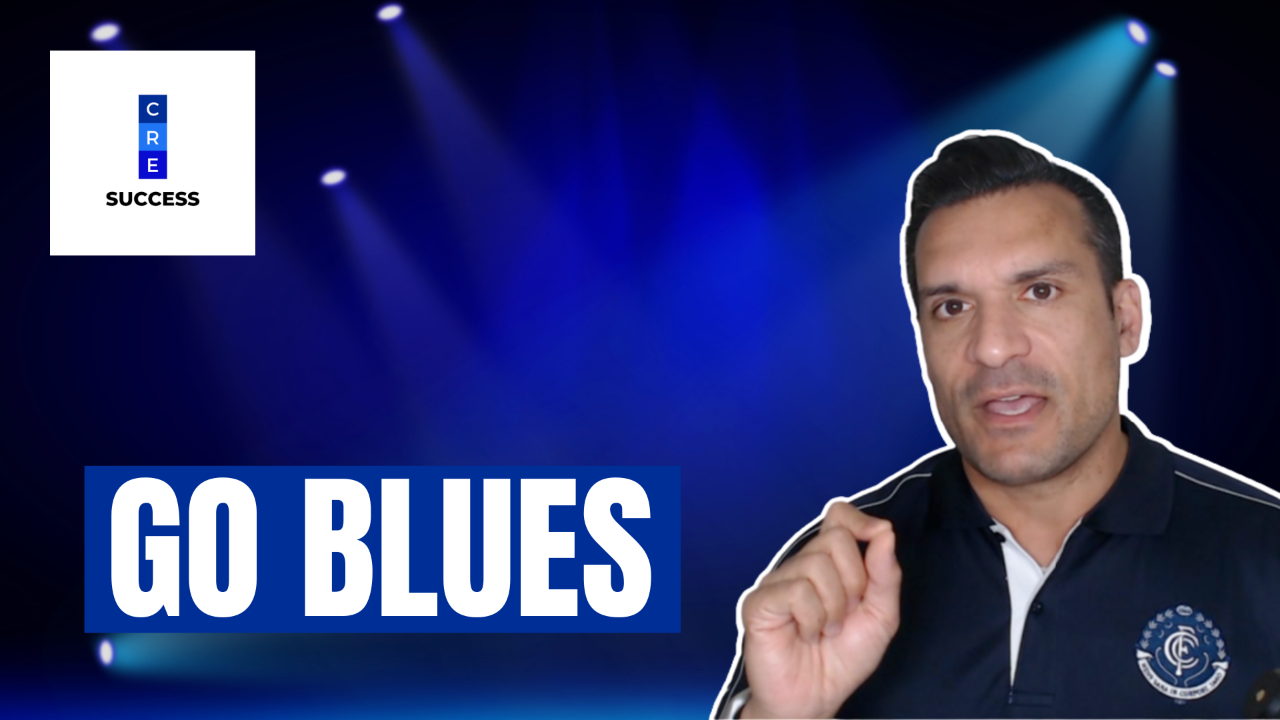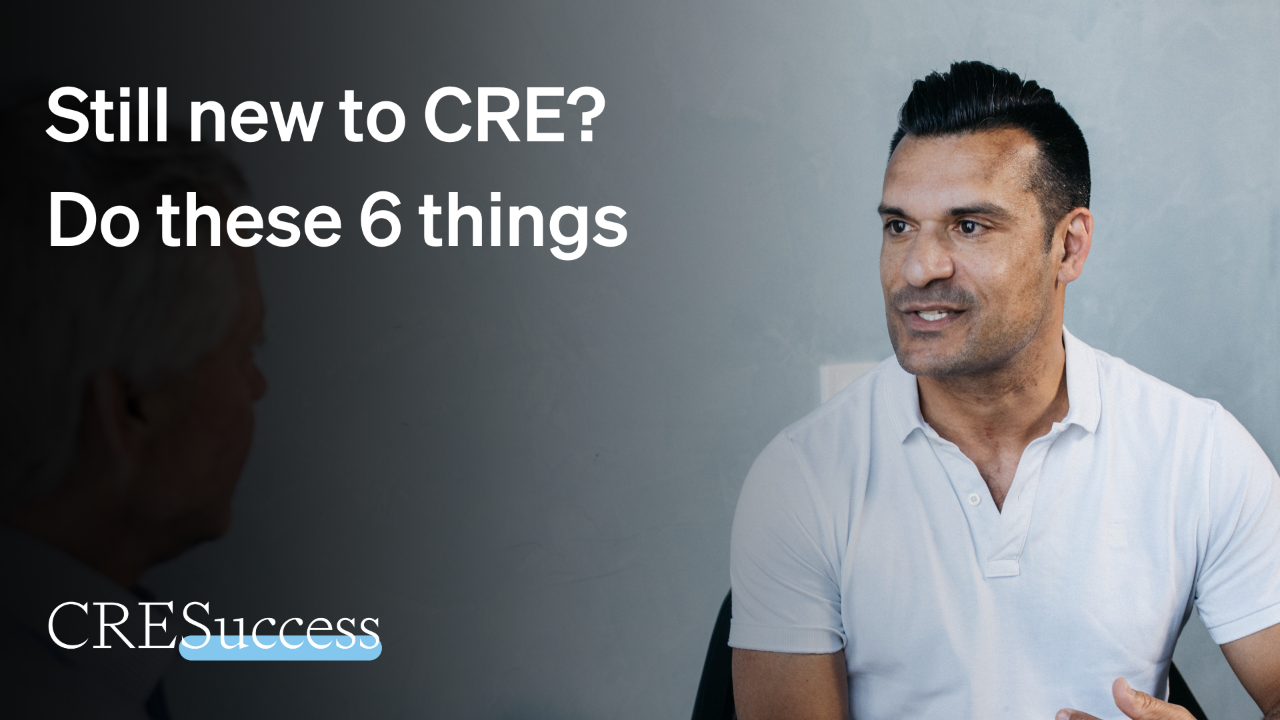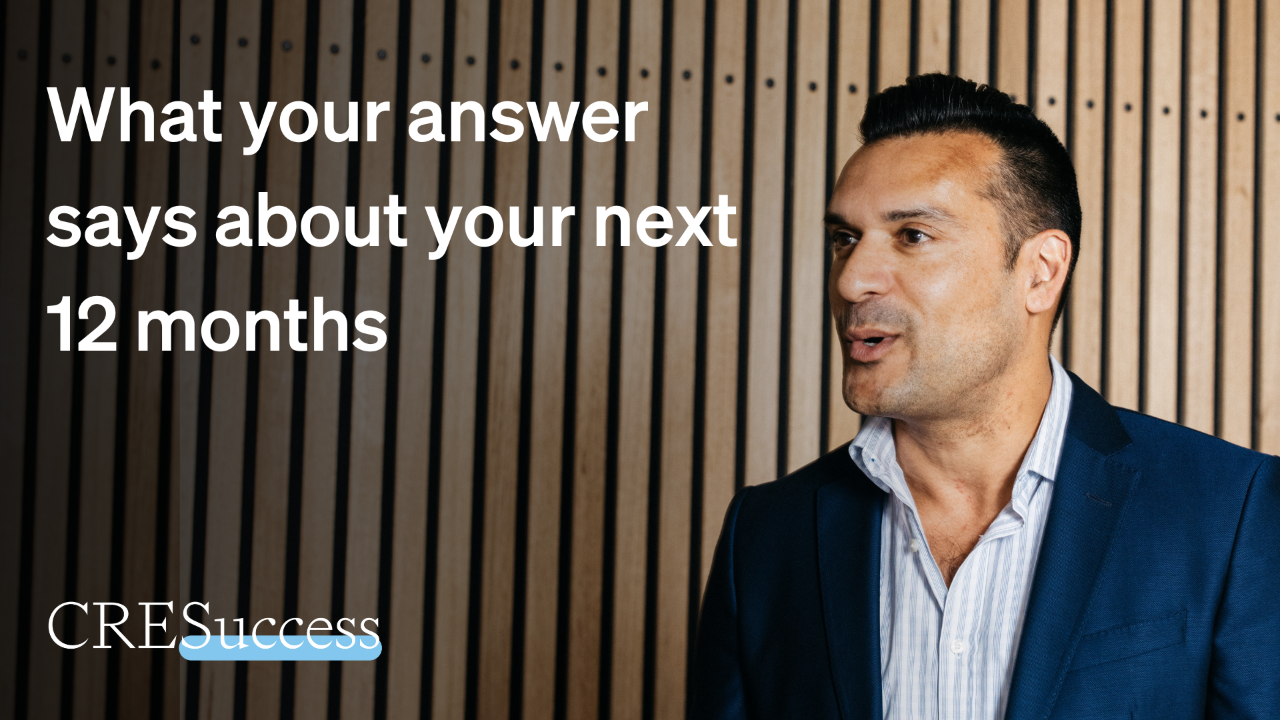Lessons from a five-month distraction of too much footy
Sep 06, 2023
Over the past five months, I've probably watched too much footy (Australian Rules Football).
But this distraction hasn't just been for naught – not only did I win the footy tipping (a.k.a. picking the most winners through the entire season) with a score of 150, it has also uncovered a treasure trove of insights that I'm excited to share with you now.
🔝 Rising Above Setbacks: Lessons from Carlton Football Club
I’m a Blues fan. The club’s journey in 2023 – from a peak of 2nd down to a trough of 15th and then finishing at 5th – mirrors the ups and downs we face in commercial real estate.
As I look forward to their first finals appearance in a decade tomorrow night, the team’s focus and resilience during this tumultuous period has really caught my attention.
Here are three key takeaways:
🎯 Diagnose the problem and then create a strategy
As the losses mounted and the critics grew louder, the coach identified one area for improvement: defence-first.
This shows that you need to start somewhere; whilst the key to success is usually improving a number of small things, focusing on one main thing first can be the spark for overall growth – whether it's lead generation, prospecting, property marketing or closing deals.
🤝 Team Unity and Trust is a Winning Formula
Just like in business, individuals matter in football – everyone has a role to play.
Acknowledging and valuing each team member's contribution drives a sense of collective responsibility. Carlton's culture of trust and accountability, especially during tough times, is an example of how unity can build success.
🏆 System Mastery for Consistent Success
On the other hand, robust systems almost always trump individual brilliance.
Carlton's defensive focus and the lowest-average-score-against in the second half of the season shows that a well-structured system is a game-changer, ensuring collective success even when individual capabilities vary – and a lack of personnel (or, in the case of sport, injuries) means you’re asking others to dig deeper.
🏉 From the Stadium to the Boardroom
These three points are relevant for commercial real estate leaders – even those who don’t know anything about Aussie Rules.
Because just as Carlton overcame adversity, commercial real estate leaders can navigate challenges by creating a plan, fostering unity, and building a robust system.
Short-term hiccups and external criticism need not steer you off course; diagnosing issues and a strategy that your team can follow will ultimately lead to triumph.
For a deeper dive into these footy-inspired lessons for commercial success, tune in to episode 156 of CRE Success: The Podcast.
Episode transcript:
Over the last five months, I've been pretty distracted by the Australian Football League (AFL) season’s Aussie rules.
And that has led me to actually observe some interesting things that have been going on with my team who have had a massive turnaround throughout the season.
I've also managed to win the footy tipping, which I'll tell you about in a moment.
And I want to share with you some of the, I guess, learnings from this distraction which has taken me away and taken my focus and attention away from my day-to-day business, but also some of the benefits that perhaps that can bring to me and hopefully also bring to you.
Hello, and welcome to episode 156 of CRE Success: The Podcast. I'm Darren Krakowiak. I'm your host. I help commercial real estate leaders to accelerate growth in their business.
Really appreciate you being there for today's episode of the show.
And I've put a first up give a little shout out to Rod King for a wonderful review that he left on Apple podcasts.
Rod says, "I've had the pleasure of seeing Darren present in person a few times and find the podcasts great and informative. There are a few I've gone back and listened too many times, no matter where you are in your journey. There is great content here for you."
Thank you so much for that review, Rod. And to everyone else who has left a review on Apple podcasts or on Spotify as well, they really do mean a lot to me.
So, if you're in a position to leave us a five-star review and even write a review for us, we would love to see it.
And it just so happens that Rod is also a Carlton Football Club supporter, which is my club as well in the AFL.
And it's been an interesting season. First of all, I've got to point out that I did win the footy tipping.
Now if you're not from Australia, you might know of March Madness brackets in the States. It's basically the same thing.
It's going through and picking the winner of each game over the whole season, which runs for five months. And it is a massive distraction. It's a massive investment of time.
Some people say that in order to win the footy tipping, you need to know nothing about football.
But I think that you actually do need to know a bit about football, you need to make some tough calls, some contrarian calls on games, where you go against who the favorite is, you go against where the money is going, and you make a call based on your beliefs.
And I think a few of those calls actually helped me out and enabled me to win the $800 in one footy tipping competition I was in.
Another one, which was just for bragging rights and then meet a mate who were playing against each other for dinner.
So, it's been a profitable season. I did sort of think to myself, "Well, if I invested the amount of time that I invested in fully tipping into my business, would I have made more than the $800 and a free dinner?"
I think I would have made a lot more than that.
But I think it's also worthwhile to be balanced and to have interests outside of your day-to-day business, your day-to-day work. So, I think it was still a good investment of time.
And I think some of the things that I've learned throughout the season as well, which I'm going to share with you in today's episode also makes it a worthwhile investment of time, even though we're talking about hundreds of hours when you consider the games that I've watched the shows the analysis that I listened to.
But anyway, let's talk about Carlton Football Club, which started the year relatively strongly, but then had a mid-season slump.
They lost eight out of nine games and they fell to 15th position on the ladder in an 18-team competition.
Well, they eventually clawed their way back through a nine in a row winning streak to finish fifth and qualify for the finals.
And one thing that I noticed with the Carlton Football Club is that they stuck to the plan.
They didn't get distracted by all the noise. And there was a lot of noise that was going on in that time when they lost eight or nine games.
And one of the things that the coach Michael Voss says was that they need to focus on defense.
Even though they had issues with ball movement, they had issues with competence, they had issues with system, they had issues with scoring, he said, "Right now what we've got to do is focus on defense."
And that was the problem that he identified.
And if you're leading a commercial real estate business, I think you've got an opportunity to identify what is the one thing that we're going to focus on and improve, and then we'll start to improve other things.
So, it might be around lead generation, it might be around a commitment to prospecting, it might be around turning opportunities into listings, maybe you're not turning listings into revenue.
If you can diagnose where the problem is, and then create a plan, that's open the first step towards digging yourself out of the hole that you're in.
The other thing that I think Carlton did really well this year was, after they got through the eight of nine games that they lost was that they got to a point where people really understood what their role was within the structure that was the game plan.
And I noticed in several interviews that players were talking about the fact that they had real confidence in being able to rely on their teammates to perform their role.
And just as in a commercial real estate business, everyone has an important role to play.
And that's why, as a leader, of course, we need to value everyone's role and contribution and make sure that they understand how the contribution that they're making is important to the overall performance of the team.
So, each player could then play with an understanding that their teammates was not going to let them down. They weren't playing for themselves.
And system, I think, is more important than, well, individuals. And it's more important than the capability of any one individual.
I've said before, "You don't rise to the height of your goals, you will fall to the level of your systems."
Even if you've got a weak link in your team, (of course, I would recommend that you try your best to have a team of strong players.)
But even if there is someone who perhaps isn't as strong as the others, if you've got strong systems in place, that person can only fall as far as that system will allow them to.
So, systems are really important to make sure that we can put a floor under where performance can get to.
And of course, no one person is bigger than the system. And the system requires every person to play their part.
Now within the Carlton Football Club, there are some interesting individuals, including the coach Michael Voss, a real competitor, a real leader, massive accolades.
If you follow AFL, you'll know that he's one of the most decorated players to play.
But his coaching career has not been as I guess, decorated, because he, in many instances could be considered an unsuccessful coach.
He was coaching the team he played for five years and didn't have the best record.
But he had the humility after that, to then go and be an assistant coach for many years in another club, and was finally given the opportunity to be a senior coach again, after I think, maybe seven or eight years of being an assistant coach.
So, I think that shows a real ability for him to recognize that, "I'm committed to this. But also, if I can't get the opportunity to be the leader that I believe that I can be, then I'm going to go back and I'm going to do what I need to do to ensure that when I am next in that coaching or leadership role, that I'm really prepared and ready for it."
And I think he's proven to be that person.
Our captain as well, Patrick Cripps, very much a lead by example, guy. But he had a few poor games as well.
He was the best player in the league last year, the MVP, the Brownlow medalist, but he got a former slump.
And I think he had to look at himself, I think, when people were calling for the coach to be sacked, everyone stuck together, they didn't turn on each other.
They didn't make examples of each other. They also, though, took on some collective responsibility.
And I think that's around the environment that Michael Voss and I guess probably Patrick Cripps as well have created within the club.
So, there was a story where they all went to the countryside and stayed at one of the players holiday homes, and looked at each other in the eye.
And basically, had some conversations where they called each other out on the fact that they weren't doing all that they can to help the team be the best that it could be.
So, if you've got the environment where people have enough trust, to be able to call each other out, but also understand what is required, the standards that we're going for, then we're more likely to have not only all of that, I guess, responsibility for performance, falling on the leaders, but also having individuals within the team taking some responsibility.
It really shows the importance of building culture but also sticking together for adversity.
It was it was pretty dark times in terms of the noise that was in the media. But you know, they kept on believing.
They said that their goal was to not only play finals, but to impact finals.
We'll see if that happens with the finals start this weekend. But certainly, they've got themselves in a position to do that.
And it looked very unlikely that was going to happen halfway through the year.
And in fact, when it looked unlikely, one of their main players came out and said, "Look, it's not about finals as well just for final sake. It's about us improving."
And some people sort of saw that as a cop out. And they copped a bit of flack in the media for saying that, but I think that what they were going for and what the beliefs that they had have been proven to, to have given them the results that they were looking for.
And I guess one other thing I would say about the defense first approach that they took was that once they made that commitment, they then had the lowest average scored against them, so they became the strongest defense in the league in the final 10 rounds.
But also, they got back to what they were best at understanding where their strengths were.
They're a clearance and contest team, and they've got the highest score differential points from clearances.
They're not the best at the turnover game, even though that's where the game is going. But certainly they know what their strengths are. And they are known for being really fierce at the contest.
And I guess the lesson there is, well, what is it that differentiates your team? What is it that you can be the best at? And what is it that you're going to be known for in the marketplace, so that anyone else who claims to have that position will be not able to credibly hold that because everyone knows that is the corner of the market, that is the specialty that you have, that is where you distinguish yourself.
So, look, I know that not everyone's an AFL fan, not everyone who listens to this show is in Australia.
But I hope that some of what I've been able to share with you today has resonated from the perspective of having a team, understanding what everyone's roles are, being a leader that's creating their environment where people can be the best that they can be.
And also, when things aren't going right, having confidence that if we've got the right plan in place, if we've got a good structure and systems that we will get there in the end.
So not panicking, where there are short term fluctuations in performance, but also diagnosing as to why they might be and then taking remedial action to get the team back on course.
So, for now, I'm going to go back and start watching the finals. I hope that it will continue to distract me a little bit longer because I'd like to see us in a preliminary final, which means we need to win two in the finals.
We'll see if that happens. Put it out there now. So, we will see. I'm very happy that we're in the finals though. So that's, I'm pretty happy with that. Let's just say that.
So that is our episode for today. Thank you so much for listening, and I will speak to you soon.








